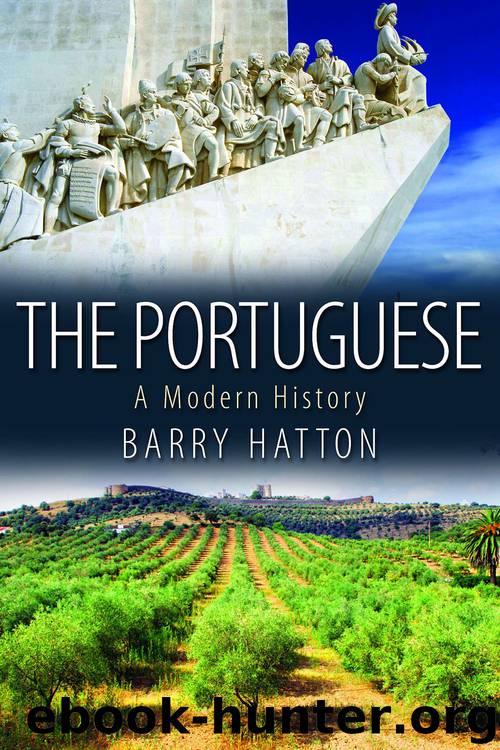The Portuguese by Barry Hatton

Author:Barry Hatton [Hatton, Barry]
Language: eng
Format: epub
ISBN: 9781908493385
Publisher: Andrews UK
Published: 2016-01-06T05:00:00+00:00
God, Homeland, Family
Salazarism depicted Portugal in a cultural triptych featuring the so-called “Three Fs”: fado (traditional Portuguese music), football and Fátima. His regime co-opted the traditional fado genre as something authentically Portuguese, unsoiled by outside influences. Football, as a sort of opium of the masses, also warranted Salazar’s attention. Eusébio, Benfica’s star player of the 1960s, appeared set to be poached by big Italian and Spanish clubs which offered the Lisbon club phenomenal sums for him. Salazar, sensing that Eusébio’s departure could arouse discontent, stepped in and designated the player a “national treasure”, meaning that he could not be sold abroad.
Fátima is the small rural town north of Lisbon where three shepherd children claimed that the Virgin Mary appeared to them in 1917. The town’s shrine is a potent symbol of the Church’s enduring influence in Portugal. Even now, no visitor to Lisbon can fail to spot the huge statue of Christ the King which overlooks the capital from the south bank of the River Tagus, its arms outstretched in a come-hither gesture. Inspired by the statue on Sugar Loaf Mountain in Rio de Janeiro, it was built as thanks for keeping Portugal out of the Second World War and inaugurated in 1959.
Pope Paul VI visited Fátima for the fiftieth anniversary of the apparitions in 1967. The pontiff’s visit, coming at a time when the country was under strong international pressure over political repression at home and in its African colonies, merited rare live television coverage in Portugal. Even though the pope, in a discreet nod to the protests, avoided Lisbon and Salazar had to go and meet him at an Air Force base where he landed, the visit was an honour and a respite for a regime engaged in a diplomatic rearguard action at the United Nations and elsewhere. During his stay the pope notably made no mention of civil rights in Portugal nor of the military campaign against African independence movements.
The Cross and the Crown have mostly been united since the birth of the nation. The Catholic Church had played a key role in ensuring public support during the reconquista and was rewarded with wealth and influence. It was affiliated with the voyages of discovery in the fifteenth and sixteenth centuries when fleets set out from the riverside suburb called Belém, Portuguese for Bethlehem. The historical heroes crowding onto Belém’s Monument to the Discoveries clasp swords and crosses. Apart from brief periods when it was in crisis - during the rise of liberalism in the early nineteenth century and when the Republic arrived in the early twentieth, though some clergy were simply banished rather than shot, as many were during the Spanish Civil War - the Catholic Church has held a central role in Portuguese society. At the time of the Second World War, Portugal had twice as many priests as doctors. In a speech in Porto in 1949, Salazar proclaimed:
Portugal was born in the shadow of the Church, and from the outset the Catholic religion has been
Download
This site does not store any files on its server. We only index and link to content provided by other sites. Please contact the content providers to delete copyright contents if any and email us, we'll remove relevant links or contents immediately.
| Africa | Americas |
| Arctic & Antarctica | Asia |
| Australia & Oceania | Europe |
| Middle East | Russia |
| United States | World |
| Ancient Civilizations | Military |
| Historical Study & Educational Resources |
Room 212 by Kate Stewart(4146)
The Crown by Robert Lacey(4135)
Endurance: Shackleton's Incredible Voyage by Alfred Lansing(3886)
The Iron Duke by The Iron Duke(3674)
The Rape of Nanking by Iris Chang(3564)
Killing England by Bill O'Reilly(3486)
Joan of Arc by Mary Gordon(3289)
Say Nothing by Patrick Radden Keefe(3103)
I'll Give You the Sun by Jandy Nelson(2866)
Shadow of Night by Deborah Harkness(2778)
Hitler's Monsters by Eric Kurlander(2760)
Margaret Thatcher: The Autobiography by Thatcher Margaret(2706)
Mary, Queen of Scots, and the Murder of Lord Darnley by Alison Weir(2696)
Darkest Hour by Anthony McCarten(2671)
Blood and Sand by Alex Von Tunzelmann(2630)
Red Famine: Stalin's War on Ukraine by Anne Applebaum(2492)
Eleanor & Park by Rainbow Rowell(2426)
The One Memory of Flora Banks by Emily Barr(2374)
Book of Life by Deborah Harkness(2304)
